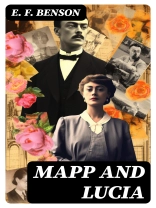In ‘Mapp and Lucia, ‘ E. F. Benson intricately explores the social dynamics of the English upper class during the 1920s, encapsulating the rivalry between two formidable women, the ambitious and cunning Lucia Deed and the scheming yet endearing Mapp. Employing a sharp wit and an observational style reminiscent of P.G. Wodehouse, Benson crafts a comedic narrative filled with intricate plots, engaging dialogue, and vivid characterizations that offer both humor and social critique. The novel captures the essence of the ‘Bright Young Things’ era, reflecting societal shifts while providing acute insights into human behavior within a small, insular community. E. F. Benson, an accomplished English novelist, was deeply embedded in the social fabric of his time, which greatly influenced his writing. The son of a bishop and raised in a privileged environment, Benson’s experiences in elite circles allowed him to satirize the very society he inhabited. His extensive career also included works of horror and biographies, but it was through ‘Mapp and Lucia’ that he left an indelible mark on the literary landscape, creating a lasting legacy through his humorous yet poignant depictions of social rivalry and class. This delightful novel is a must-read for those who appreciate sharp humor intertwined with keen social observation. Benson’s engaging prose and colorful characters invite readers to relish the antics of Lucia and Mapp, making it an enjoyable exploration of ambition, rivalry, and the absurdities of social status. Whether you are a fan of English literature or are seeking an engaging satire of early 20th-century society, ‘Mapp and Lucia’ stands as a brilliant testament to Benson’s literary prowess.
Circa l’autore
Edward Frederic Benson, known as E. F. Benson (1867-1940), was an English novelist, biographer, memoirist, and short story writer, best recognized for his Mapp and Lucia series, which satirized the social pretensions and petty rivalries of provincial English townsfolk. Born in Berkshire and educated at Marlborough and King’s College, Cambridge, Benson was a prolific writer and produced a variety of works throughout his career, including ghost and horror stories. His series featuring the characters Miss Elizabeth Mapp and Mrs. Emmeline Lucas (Lucia) is celebrated for its comedic wit and incisive depiction of British social mores. ‘Mapp and Lucia’, the fourth book of the series, is often acclaimed as a high point of his fictional achievements. Beyond this series, Benson’s range encompassed biographies – with notable works on Queen Victoria and Charlotte Bronte – and nearly one hundred books across different genres. His style is characterized by a sharp and often acerbic wit, penetrating social observation, and an underlying humane insight. Benson’s work influenced later satirists and remains popular, enjoyed for both its historical value and its humorous take on British society during the Edwardian and interwar periods.












